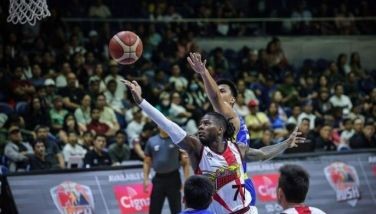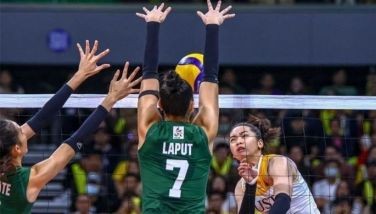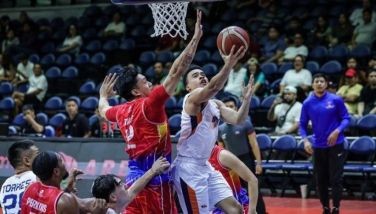The man who changed the game
March 15, 2003 | 12:00am
Each time I step onto the floor at the Moro Lorenzo Sports Center at the Ateneo de Manila, I remember Wilt Chamberlain. It’s partly because the floor there comes from the 2000 NBA All-Star Game, held at the GoldenState Warriors’ home court. This was where the last tribute to the deceased legend was held, because he used to be a Philadelphia Warrior.
I only wear two numbers when I play: 13 and 6. 13 because that was the number Wilt wore, and because most superstitious players avoid the number 13. I wear 6 for Julius Erving. They were two players who influenced the game, Erving subjectively, Chamberlain objectively. But the more I studied basketball’s history, the more I realized how profoundly Chamberlain influenced our favorite sport.
First of all, many rules evolved as a result of the NCAA running smack into this Goliath. Before he even set immortal records like 100 points in a game or never fouling out his entire pro career, Wilt was, first and foremost, a black man in a Caucasian America in the late 1950’s. Equality was not a consideration in most places.
Chamberlain was recruited heavily after a sensational career at Overbrook High, but ran headlong into racial discrimination even before going to college at Kansas. He drove over a thousand miles from Philadelphia, went into a diner, and was refused service. He drove straight to coach Phog Allen’s house, and said he would not play college ball unless they did something about prejudice against blacks. As a result, Kansas refused to play teams that would be hostile towards their black players. That was the first rule Wilt changed.
Chamberlain had an even bigger impact on the college game. Before he came along, you could actually run from behind the free throw line and shoot on the fly. After seeing him take a running start and dunk after taking off from behind the free throw line, The Big Dipper and all other players were disallowed from moving once behind the stripe. In fact, the new rule (still in use today) was that you could not cross the line until after the ball had hit the hoop or backboard.
Offensive goal-tending was also a new wrinkle in Wilt’s day. He used to jump over everybody (he lettered in track as well as basketball) and tip or dunk the ball back in. Well, the NCAA soon outlawed that, instituting the imaginary cylinder which was in use until the early 1990’s. When the Dream team first took to the floor in the Tournament of the Americas in 1992, they were allowed to touch the ball after it had hit the rim, whether it was still above the goal or not.
Lastly, Kansas had a baseline inbound play wherein a teammate would inbound from beneath the backboard, throw the ball over it, and Chamberlain would swoop in for a dunk. Soon, having the ball pass over the backboard became a no-no, too.
The Big Dipper (he was called that because he kept dipping his head in doorways) also defied convention by playing for the Harlem Globetrotters before joining the NBA, even though he was already being drafted. Chamberlain simply felt he wasn’t ready, and spent a year touring Europe and the United States with the Globies.
He was also the first player to earn a six-figure salary in the NBA. The league’s stars, like Bob Cousy, were earning about $25,000. Wilt had wangled his way to $100,000, and eye-popping sum.
In many ways, he became a sophisticated, 7’1" version of Muhammad Ali. He spoke English, Italian, French, German and Spanish, and a smattering of other languages. He was a victim of racial abuse who never became bitter, and fully benefitted from the system that once alienated him. He became prosperous when other black athletes weren’t. He stood up for himself, but never became obnoxious.
When he died at 60, many people felt his career had not been complete, because he could have won many more championships. But, politically, economically and racially, he kicked open the door for many who would follow.
And he was still a hell of a basketball player.
Watch this week’s episode of The Basketball Show, which features Danny Ildefonso, Jay R Reyes, primers on the upcoming PBL season, and much more. The Basketball Show is on Saturdays at 4:00 p.m. over IBC-13. You may reach us at [email protected].
I only wear two numbers when I play: 13 and 6. 13 because that was the number Wilt wore, and because most superstitious players avoid the number 13. I wear 6 for Julius Erving. They were two players who influenced the game, Erving subjectively, Chamberlain objectively. But the more I studied basketball’s history, the more I realized how profoundly Chamberlain influenced our favorite sport.
First of all, many rules evolved as a result of the NCAA running smack into this Goliath. Before he even set immortal records like 100 points in a game or never fouling out his entire pro career, Wilt was, first and foremost, a black man in a Caucasian America in the late 1950’s. Equality was not a consideration in most places.
Chamberlain was recruited heavily after a sensational career at Overbrook High, but ran headlong into racial discrimination even before going to college at Kansas. He drove over a thousand miles from Philadelphia, went into a diner, and was refused service. He drove straight to coach Phog Allen’s house, and said he would not play college ball unless they did something about prejudice against blacks. As a result, Kansas refused to play teams that would be hostile towards their black players. That was the first rule Wilt changed.
Chamberlain had an even bigger impact on the college game. Before he came along, you could actually run from behind the free throw line and shoot on the fly. After seeing him take a running start and dunk after taking off from behind the free throw line, The Big Dipper and all other players were disallowed from moving once behind the stripe. In fact, the new rule (still in use today) was that you could not cross the line until after the ball had hit the hoop or backboard.
Offensive goal-tending was also a new wrinkle in Wilt’s day. He used to jump over everybody (he lettered in track as well as basketball) and tip or dunk the ball back in. Well, the NCAA soon outlawed that, instituting the imaginary cylinder which was in use until the early 1990’s. When the Dream team first took to the floor in the Tournament of the Americas in 1992, they were allowed to touch the ball after it had hit the rim, whether it was still above the goal or not.
Lastly, Kansas had a baseline inbound play wherein a teammate would inbound from beneath the backboard, throw the ball over it, and Chamberlain would swoop in for a dunk. Soon, having the ball pass over the backboard became a no-no, too.
The Big Dipper (he was called that because he kept dipping his head in doorways) also defied convention by playing for the Harlem Globetrotters before joining the NBA, even though he was already being drafted. Chamberlain simply felt he wasn’t ready, and spent a year touring Europe and the United States with the Globies.
He was also the first player to earn a six-figure salary in the NBA. The league’s stars, like Bob Cousy, were earning about $25,000. Wilt had wangled his way to $100,000, and eye-popping sum.
In many ways, he became a sophisticated, 7’1" version of Muhammad Ali. He spoke English, Italian, French, German and Spanish, and a smattering of other languages. He was a victim of racial abuse who never became bitter, and fully benefitted from the system that once alienated him. He became prosperous when other black athletes weren’t. He stood up for himself, but never became obnoxious.
When he died at 60, many people felt his career had not been complete, because he could have won many more championships. But, politically, economically and racially, he kicked open the door for many who would follow.
And he was still a hell of a basketball player.
BrandSpace Articles
<
>
- Latest
- Trending
Trending
Latest
Trending
Latest
Recommended































